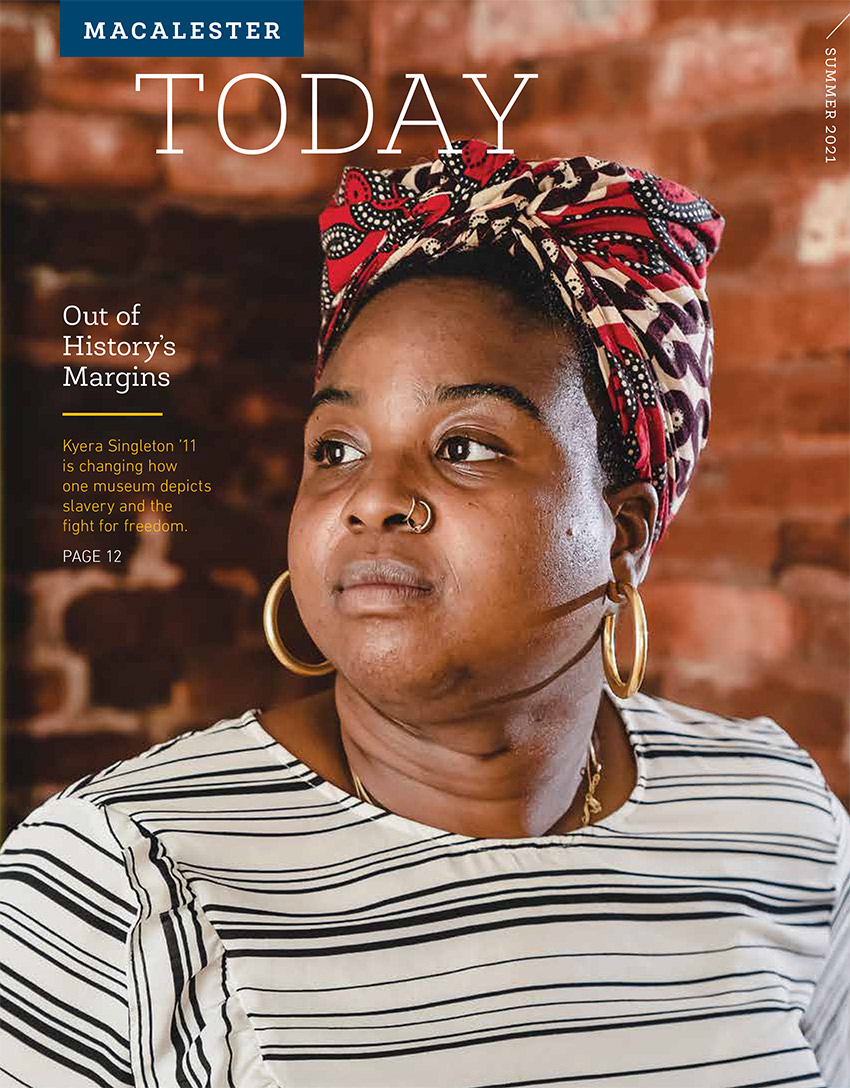
“I wanted to explore the intersection between having a disability that affects speech versus communication as an overall medium,” Ashley Allen ’21 (Wayzata, Minn.) says about her portrait, part of Radical MacACCESS’s virtual art gallery. “My disability not something most people notice—however, it continues to provide a foundation for how I view and experience the world.”
By Rachel Rostad ’15
The pandemic radically transformed the way Macalester operates—and amid many challenges, Maya Lawnicki ’22 (Milwaukee, Wis.) saw an opportunity. In a course called “Being Human in STEM,” co-taught by professors Devavani Chatterjea and Louisa Bradtmiller, Lawnicki and her classmates discussed how quickly the college made fundamental changes to classrooms. “If we could make adjustments because of the pandemic so quickly, why couldn’t we make these same adjustments to diversity, equity, and inclusion that fast as well?” she says. “It made me think, what can I be doing now that can encourage conversations about inclusivity?”
The answer: a panel on inclusivity in teaching. Lawnicki recruited faculty to speak, and facilitated a discussion about creating inclusive classrooms in the pandemic and beyond. The panel was part of Radical MacACCESS, an annual program founded in 2018 to create space for students, faculty, and staff that identify as disabled. Led by a committee of twelve students this year and supported by Center for Disability Resources, Radical MacACCESS is designed to build community and foster discussion. This year, organizers hosted a keynote with Kay Ulanday Barrett, a poet, performer, and cultural strategist who advocates for disability justice. A virtual art gallery featured work by disabled and neurodiverse students, lifting up their experiences and voices.
As Lawnicki’s panel showed, the pandemic spotlighted the need to place accessibility front and center in the Macalester community. Students, faculty, and staff had to address the challenge of remote classes and programs, as well as the mental health impact of increased anxiety, depression, and isolation. Faculty recorded lectures, began class with “minute mingle” check-ins, and gave students the option of exploring multimedia assignments, such as podcasts and social media posts. Center for Disability Resources, a campus office that works to ensure equal access to academic and co-curricular activities, piloted remote drop-ins and online programs. These adjustments, far from being a stop-gap measure, have the potential to transform access at Macalester in the years to come.
Center for Disability Resources coordinator Josie Hurka emphasizes the importance of designing universal learning environments that work for everybody, comparing it to door opener buttons, which are used by everyone: “Everything we’re doing in terms of access and design works for everybody. Wouldn’t it be amazing if we didn’t need accessibility programming anymore?”
The students and staff of Radical MacACCESS see hope of this vision becoming a reality. Plans are already being developed to continue practices such as remote office hours and flexible attendance policies, as well as restructuring programs and teaching methods to serve students’ needs more holistically. “It’s not a return to normal,” says Melissa Fletcher, director of Center for Disability Resources. “It’s a return to better.”
July 26 2021
Back to top





